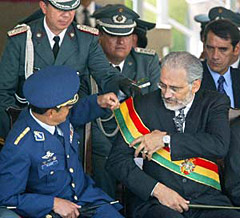 |
 |
 |
 News from Around the Americas | June 2005 News from Around the Americas | June 2005  
Bolivian President Offers to Resign, Citing Mass Demonstrations
 Juan Forero - NYTimes Juan Forero - NYTimes


| | Embattled Bolivian President Carlos Mesa announced Monday that he will submit his resignation to the National Congress. |
Bogota, Colombia - With Bolivia paralyzed by protests, President Carlos Mesa announced his resignation on Monday night in a nationally televised address. Explaining that road blockades and marches had made Bolivia ungovernable, he said, "My responsibility is to say this is as far as I can go."

"For that reason, it is my decision to present my resignation as president of the republic," he said in the speech, which was carried live by CNN en Español.

The offer to resign was the embattled president's second in three months. In March, the former journalist and historian offered to quit in a calculated gamble aimed at rallying support in the face of road-choking protests. The tactic worked, and Congress rejected the offer, giving Mr. Mesa a new start.

This time, he also seemed to leave it up to Congress, saying, "I will continue to be president until the Congress makes a decision and defines the future of the country."

If Congress accepts the resignation, the next in line to take over would be the president of the Senate, Hormando Vaca Díez. Mr. Díez, however, would not be a palatable choice for most Bolivians, political analysts say, nor would the third in line to the presidency, Mario Cossío, the president of the lower house of Congress.

The next choice, the Supreme Court president, Eduardo Rodríguez, does have political support. Under the constitution, he could then call early elections, a scenario that has the support of Evo Morales, Bolivia's most influential protest leader.

Mr. Mesa's decision came after more than three weeks of escalating protests by powerful indigenous and anti-globalization groups demanding that the government nationalize the private energy firms that flocked to Bolivia to mine Latin America's second-largest natural gas reserves.

Though Congress on May 17 sharply raised taxes on foreign multinationals, among them Petrobras of Brazil, Repsol YPF of Spain and British Gas, the population was not placated. Protests in recent days have blocked most highways, isolating cities and making gasoline and staples like milk and eggs scarce.

Mr. Mesa became president in October 2003 after protesters forced President Gonzalo Sánchez de Lozada to resign. He convened a referendum last year in which Bolivians asked for more state control of the country's natural gas.

But Mr. Mesa was rocked by more than 800 protests, as indigenous groups in the western highlands demanded more say in the country's economic future and pro-business groups in the country's affluent east sought more autonomy.

On Monday night, he called their tactics "violent and excessive," saying they took advantage of his government. | 
 | |
 |



